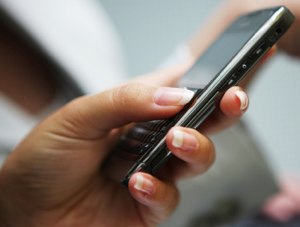 Are cell phones appropriate at the dinner table? For many, the answer is an obvious “no.” Not only answering a call or viewing a text at a meal, but also placing the phone on the table or refusing to turn it on silent are considered rude gestures while dining. Yet for a younger generation constantly connected through text messaging or email via cell phones, perceptions of what is rude and what is acceptable vary greatly. Feelings are mixed as to whether the presence of cell phones at the dinner table truly are inappropriate, and to what degree it is proper to use them. What constitutes these variations has ample justification and sound reasoning. Nevertheless, as a member of the Millenial generation, I would argue that keeping phones away from the dinner table – regardless of whether you are in a restaurant or at home, or from a younger or older generation – is essential, not only for polite dining but also for preserving our genuine interactions.
Are cell phones appropriate at the dinner table? For many, the answer is an obvious “no.” Not only answering a call or viewing a text at a meal, but also placing the phone on the table or refusing to turn it on silent are considered rude gestures while dining. Yet for a younger generation constantly connected through text messaging or email via cell phones, perceptions of what is rude and what is acceptable vary greatly. Feelings are mixed as to whether the presence of cell phones at the dinner table truly are inappropriate, and to what degree it is proper to use them. What constitutes these variations has ample justification and sound reasoning. Nevertheless, as a member of the Millenial generation, I would argue that keeping phones away from the dinner table – regardless of whether you are in a restaurant or at home, or from a younger or older generation – is essential, not only for polite dining but also for preserving our genuine interactions.
Communication via text message is now so common that it can seem that we text more often than we talk. This goes for any age group, but is especially widespread among a younger generation of teens and twenty-somethings. Texting is now such a routine form of communication that we can easily engage in another activity while simultaneously sending off a quick message or finalizing plans with a friend. The ubiquity and immediacy of texting, however, opens a new debate of what is rude and what is acceptable. If a friend expects you to answer her text as soon as you receive it, wouldn’t it be considered rude if you don’t answer right away? Even if you choose not to respond promptly, shouldn’t you read the text to make sure it’s not an urgent matter? When reading and sending text takes such a short amount of time, it can be hard to simply ignore.
These questions demand extra scrutiny when in the context of dining. With these expectations, one might feel caught between two potentially rude situations: disregarding messages that would normally merit a prompt response, or brushing off friends or family at the table to check a text or a call in the middle of a meal. Another component that could justify phones at dinner is if fellow diners find it acceptable, and who also might be checking messages or reviewing calls.
Regardless of the number of reasons at hand to justify phones at the table, boundaries must be maintained. Above all, it disrupts the experience of face-to-face, real time contact between those we dine with, whether or not the value of this connection is fully understood or acknowledged. If we continue to justify the constant need to check our cell phones, respond immediately to messages, update our Facebook and Twitter status, or other online functions that require immediate attention, we risk increasingly dividing our focus until we are only halfway present in our real-life experiences. We accelerate the depletion of true engagement with and awareness of our surroundings when we have no boundaries for when and where we can use our phones.
Not to mention, bringing a cell phone to the table is still a rude gesture, whether at home or in a restaurant. The presence of a cell phone tells those you are with that they are less important than an incoming call or text, and that you are unwilling (or unable) to give them your full attention. At a restaurant, it is disruptive to diners at surrounding tables to hear a phone buzzing or ringing, or a voice loudly answering. It is disrespectful to the restaurant staff, who work hard to create an ambiance and experience for all diners, only to have it unsettled and unacknowledged by the distraction of cell phones.
There are few moments every day when we are disconnected from technology or unreachable by phone. Because of this perpetual connectivity, I think it is becoming increasingly more important to deliberately step away from the constant updates and incoming information streaming into our phones. As challenging as it can be to switch off for more than a few minutes, exercising those boundaries are key to maintaining our authentic, genuine relationships.
As President and founder of Corporate Class Inc., Diane has been on a 30-year journey as an image management expert. Diane has garnered international acclaim working with the who’s who in the business world. She has consulted with political leaders and celebrities, prepped guests of Royal families and prepared attendees of the G20 summit.



